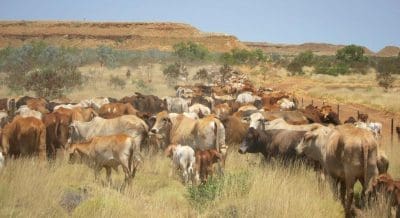A four-year partnership has been launched to coordinate and drive an integrated research and practice change program for the West Australian beef industry.
The BeefLinks program, involving the University of Western Australia and Meat & Livestock Australia through the MLA Donor Company aims to enhance the state’s red meat value chain and provide better knowledge to support producers, processors and consumers.
 The partnership aims to enhance the red meat value chain through a greater understanding of efficient use of farm resources, better use of grazing resources, and the production of cattle that reach and exceed domestic and export market standards.
The partnership aims to enhance the red meat value chain through a greater understanding of efficient use of farm resources, better use of grazing resources, and the production of cattle that reach and exceed domestic and export market standards.
A statement from UWA said BeefLinks will provide better knowledge and a range of technologies to support the sustainability credentials of the state’s products, and interconnectivity between producers, processors and consumers.
Program lead, Professor Philip Vercoe from UWA’s Institute of Agriculture and School of Agriculture and Environment said the program aimed to foster the prosperity of the red meat industry and achieve profitable, consistent and sustainable beef yields matched to consumer expectations.
“The partnership is exciting because it is based around a model of collaboration, engagement, discussion and genuine sharing of information among producers, the wider industry, state government and researchers, to make faster progress towards improving both productivity and the environmental footprint of the northern beef industry,” Prof Vercoe said.
A number of research projects are now underway that have been designed to help develop a higher-valued supply chain that is more productive and sustainable for northern WA.
 “There is a key focus on understanding more about the nutritional characteristics of the northern feedbase and how to transition animals more efficiently across different regions and landscapes. Of particular interest is using the information to strengthen the existing north-south alliance and establish practices that increase productivity and improve the consistency of growth paths in cattle that transition from north to south,” Prof Vercoe said.
“There is a key focus on understanding more about the nutritional characteristics of the northern feedbase and how to transition animals more efficiently across different regions and landscapes. Of particular interest is using the information to strengthen the existing north-south alliance and establish practices that increase productivity and improve the consistency of growth paths in cattle that transition from north to south,” Prof Vercoe said.
MLA’s group manager for productivity & animal wellbeing, David Beatty, said the knowledge developed by the BeefLinks project would be shared with producers and other supply chain operatives.
“The goal is to make sure producers and industry are an integral part of the BeefLinks partnership and to use the strategy to engage other collaborative partners,” Dr Beatty said.
“Building participant engagement and coordination within the program and with each other will foster informed and empowered participants who can confidently communicate and adopt the program messages,” he said.
In addition to this specific partnership, MLA is supporting the program through in-depth consumer and market insights analysis, linked to MSA insights and analysis, to identify possible new opportunities for higher value supply chain growth and investment.
Producers within the rangeland region of WA, producers who have the capacity to facilitate the backgrounding of cattle, and feedlots looking for new opportunities have been invited to participate in the program.
- BeefLinks is a collaborative R&D partnership involving MLA and The University of Western Australia, with matching funds provided by the Australian Government through the MLA Donor Company.
Source: UWA



Time and time again, the West Australian government has orchestrated in-depth studies, wildly ambitious projects and collaborative “whole of industry” efforts to resurrect beef production to a sustainable and profitable profile. Time and time again, it has failed due to the limited high-rainfall land area available for beef production in the state, competition from sheepmeat, wool and coarse grains in the medium and low rainfall regions and a southern beef herd barely able to satisfy domestic demand. I wish BeefLink good luck in the face of excellent returns and persistent demand for Bos Indicus live export cattle, sky-high transport costs over extreme distances and highly variable seasons